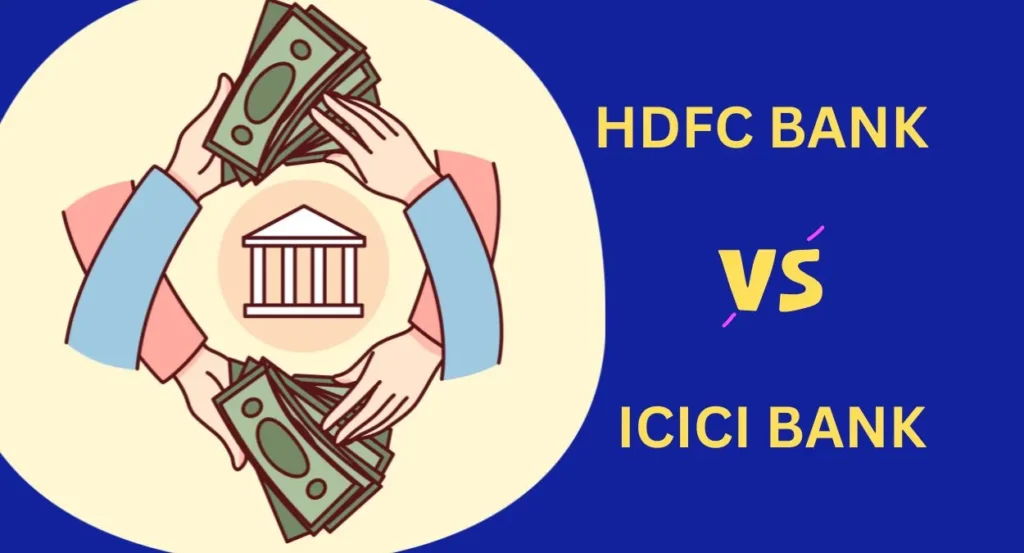When choosing between banking stocks in the Indian Banking sector, two giants stand out: HDFC Bank and ICICI Bank. Both are well-established, highly profitable, and critical in India’s financial ecosystem. But often investor faces a problem in choosing which one for the long-term. This article helps investors to choose between the two stocks by comparing their financials, market cap, growth strategy future outlook, and challenges to help the investors to make an informed decision.

Financial Performance
HDFC BANK
In Q3 FY25, HDFC Bank continues to be one the most profitable banks in India with net profit of INR 18,340 crore, reflecting a YOY growth of 19%.
The Net Interest margin has been stable at 3.4% also the company has a lower cost to income ratio at 40.5%, making it operationally efficient.
The total advances of the bank grew by 8% YOY, reaching at INR 18.9 Lakh crore.
The deposits of the bank grew at 15% YOY with CASA(current and saving accounts) forming 38.1% of total deposits.
ICICI BANK
With 14.8% YOY growth, ICICI Bank also shown significant profitability with Profit After Tax reaching INR 13,847 crore in Q3 FY25.
The loan portfolio of the bank grew by 15.1% YOY, with retail loans grew by 10.5%.
NIM(Net Interest Margin) stood at 4.25%.(which is higher than HDFC bank’s NIM.
Market Capitalization
HDFC BANK
As on March 2025, the market cap of HDFC Bank is around 13 lakh crore. HDFC Bank remain the largest private sector bank in India.
ICICI BANK
As on March 2025, the market cap of ICICI Bank is around 9 Lakh crore.
Loan Portfolio
HDFC BANK
The retail lending continues to be the bank’s stronghold, contributing nearly 50% of its total loan book. The bank focusses more on home loans and personal loans.
ICICI BANK
The bank has more diversified loan portfolio than HDFC Bank. ICICI bank has retail loans comprising 43.9% and corporate loans growing by 13.2% YOY.
Growth Strategy
HDFC BANK
In the last 12 months the bank has rapidly expanded its branch network by adding 1052 new branches, taking the total to over 8300 branches.
The company focuses more on digital banking, with over 95% of transactions now happening digitally.
The bank is also focusing more on growing retail and SME lending portfolios, particularly in tier-2 and tier-3 cities.
ICICI BANK
The bank is investing heavily on digital transformation, currently over 60% of loan disbursements are happening digitally.
The bank is Focused on risk-calibrated profitable growth, ensuring a better return on assets (ROA) at 2.3% compared to HDFC Bank’s 1.9%.
The bank has Increased its presence in rural and semi-urban markets, with over 6,742 branches as of Q3 FY25.
Future Outlook
HDFC BANK
With the bank’s strong brand, customer trust, and leadership in retail banking, HDFC Bank is expected to continue its steady growth trajectory. Analysts predict a 12-15% CAGR in net profit over the next 3-5 years.
ICICI BANK
With an improved balance sheet and strategic investments in technology, ICICI Bank is positioned for higher growth in the coming years, with an expected profit growth of 15-18% CAGR.
Challenges
HDFC BANK
the bank Faces increasing competition from fintech firms and other private-sector banks. The merger with HDFC Ltd has increased borrowing costs, putting pressure on margins.
ICICI BANK
The bank has to ensure its asset quality remains strong as it expands its loan book. The gross NPA ratio is at 2.34%, and net NPA is at 0.42%, which is lower than before but still requires close monitoring.
Final Verdict: Which Bank is a Better Buy?
For conservative, long-term investors who are looking for stability and consistent growth, HDFC Bank remains a solid choice for them due to its market leadership and lower risk profile.
And for those seeking higher growth potential and are willing to take on slightly more risk, ICICI Bank appears to be a strong bet with its improving financials and aggressive expansion strategies.
